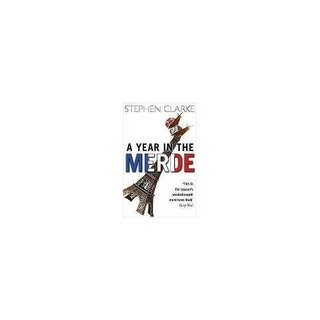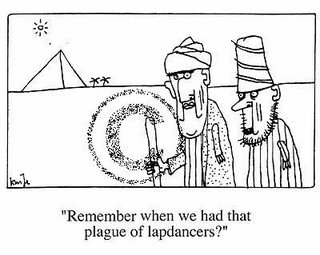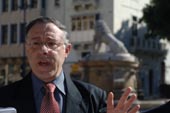
But I digress. Nespresso might not have come to Malta. But Espresso has. We like the idea and reckon that we could spin off a couple of decent pieces for it on a fairly regular basis, say once a week. After all we had written for Cafe Babel (mmm that smell of coffee again!) a few moons back. So, in keeping with the stated philosophy of the site, we sent the espresso people a quick, snappy email called "You tossers!" and offered to scribble a couple of articles replete with "blasphemy" and to do regular reviews of the most "decadent" stuff in print. The tone of our email was in jest, of course, but we honestly would like to contribute. No email back yet. After a long, distinguished career in blog journalism, we'll probably have to humble ourselves and send in individual articles praying to God that they get published. As long as they don't delete my references to 'sex explosions', I'll be fine.
PS: Oddly enough Wired Temples hasn't covered the launch.
As a digestif check out this great spoof of the Nespresso ad, featuring Jospin, Segolene, Sarko and co. courtesy of Les Guignols de l'Info.
The evidence I see around me tells me that even at the top-end of the scale we're light years away. Don't you agree?

Wired Temples, that fountain of information, trivia and links attracted my attention to Malta Calling.
It was bound to happen. And now there’s a good chance that it will.
I mean a tongue-in-cheek account of present-day Malta seen through the eyes of your unsuspecting but observant foreign resident (who happens to be an established writer). Ever since Peter Mayle brought the lavender, truffles and dolcevita of Provence to a wide audience of Anglophones, I’ve often wondered why Malta’s quirks hadn’t attracted much literary attention. Forget the knights, the temples and the Maltese falcon. What I mean is the here and now, the day to day hussle and bussle, attitudes and concerns, eccentricities and idiosyncracies. The archaic editorials of local newspapers, the strange spectacle of local politics, the beauty of a summer sunset, the rude waiter and the kind librarian, the pompous politician and the snobby columnist, the potholes and the returned migrant, the linguistic muddles and misunderstandings, the claustrophobia and the worries. The odd interview with a local politician, the chance meeting with an up-and-coming popstar. Perhaps a spot of unexpected hanky-panky leading to an analysis on attitudes to sex in a predominantly Catholic country.
I’ve got a feeling that it will read like an American version of Stephen Clarke’s A Year in the Merde, which started off as a bit of a joke and ended up as an international bestseller, translated into 14 languages (including French). Incidentally the French title is God Save La France and my friend Elodie (an Amelie Poulain lookalike) is best friends with Clarke’s former lover/present girlfriend. I promise that that’s not a blague – the Elodie in the book is actually named after her.
Here’s a typical passage from A Year in the Merde in which the narrator, Paul West, is learning how to navigate his way round the ubiquitous Parisian turd.
As you walk, your subconscious scans the pavement ahead. It learns to spot the tiniest bump on the horizon, and prepares your feet to step instinctively around it. Ask a Parisian how they manage, against all odds, to keep their feet clean. They don’t know. It’s an instinct that is part of being Parisian. Those 650 people a year who go to hospital after slipping on merde – I bet they’re tourists, or provincials, or the old and infirm suffering from depleted insticts.
Other chapters include Make amour; not war and Liberté, égalité, get out of my way.
But back to Cultural Learnings of Malta for Make Benefit Glorious Nation of United States and America. This could seriously be a breakthrough for Maltese tourism and might actually surpass Michael O’Leary’s decision to bring Ryan to Francis and Evarist. If it takes off, as I hope it will, Malta could get some fantastic publicity completely gratis. Let’s just hope that we don’t get all colonially sensitive on Michael's ass. And did we forget to say that it might turn out to be a really good read, even though we're more into Clarke than Bryson. Awguri Michael! We’re looking forward.
PS: the project I mentioned in my last post is also book-related. A few ideas have been simmering nicely. You never know. Michael and Lanzarote may be trying to outdo eachother during next year's rentree litteraire.

Something small in anticipation of the sociological, anthropological, religious and, quite possibly, geopolitical debate likely to surround this kinky development on the local scene. Incidentally here's an exquisite quote from Brandon Pisani's report for it-Torca: "Ikoll iddahhlu fl-awla tal-Magistrat Dennis Montebello, li zgur li din l-awla qatt ma rat daqshek sbuhija u gmiel f’kawza wahda."
PS: The editors of Lanzarote are thinking of suspending operations for a few weeks, possibly months. A small project is in the pipeline. Take care!

LANZAROTE EXCLUSIVE: Authors outnumber readers in remarkable island.
Lanzarote did manage to get a quick comment from young author and translator Pierre J. Mejlak who clinched the top gong in the 'Translations of Books for Children and Adolescents' category. "Narakom Brussell u ixtruli birra mill-Porte Noire" he said as our paparazzi circled round the handsome writer and his mysterious companion like famished vultures.
*********
 It's hard going for the middle-aged person known as Mrs European Union. Creeping rather uncomfortably but altogether successfully towards the big five-O, occasionally unloved and often criticised, the poor soul even gets plenty of flak when she decides to throw a little celebratory get-together to mark the big event. Some would say that she's bound to be saddled with her odd identity crisis and that adulthood, maturity and old-age will do nothing to rid her of this complicated psychological condition. Others argue that her multiple-personality disorder is actually a strength as long as Mrs EU learns to take it with a few pinches of salt. And drink to it by raising a nice cup of Earl Grey. Or an elegant glass of Beaujolais Nouveau. Or a can of Cisk Lager.
It's hard going for the middle-aged person known as Mrs European Union. Creeping rather uncomfortably but altogether successfully towards the big five-O, occasionally unloved and often criticised, the poor soul even gets plenty of flak when she decides to throw a little celebratory get-together to mark the big event. Some would say that she's bound to be saddled with her odd identity crisis and that adulthood, maturity and old-age will do nothing to rid her of this complicated psychological condition. Others argue that her multiple-personality disorder is actually a strength as long as Mrs EU learns to take it with a few pinches of salt. And drink to it by raising a nice cup of Earl Grey. Or an elegant glass of Beaujolais Nouveau. Or a can of Cisk Lager. 
Publio: Cultural Learnings of America for Make Benefit Glorious Nation of Malta!
Respect for national anthem
Publio Agius, mayor, Floriana.
The Floriana local council together with the National Festivities Committee organised an activity on Wednesday, October 18, to commemorate Dun Karm Psaila, the National Poet, near his monument in Floriana.
A group of students from Floriana Primary School took part in the event, accompanied by their teachers and heads of the school, and in the presence of the Minister for Tourism and Culture as well as representatives from the council and committee. The students read some poems written by Dun Karm and laid flowers at the foot of the monument as a symbol of respect and gratitude. I was very impressed by the children's behaviour during the commemoration, particularly during the singing of the National Anthem.
This showed the commitment by their teachers in instilling patriotic sentiments in them as well as love for their national identity. These students were worthy of representing the schoolchildren of Malta and Gozo.
At the end of the activity all students participating in the event were offered a Happy Meal sponsored by McDonalds.

Borat - Cultural Learnings of America for Make Benefit Glorious Nation of Kazakhstan
Beautiful! A masterpiece!

As the multicoloured South African Airways jumbo taxis along the runway at Heathrow's Terminal 1, the night sky is set alight by flashes of purple, green, white and orange. Four thousand feet above London, Anna remembers that it must be Divali, the Indian festival of light...
The stars shine brightly over the beautiful black emptiness of the Algerian desert and Mali...
Sunrise over the coast of Angola...
I'm listening to Miles Davis' Seven Steps to Heaven as we fly over the sun-drenched Namibian coast, we'll soon catch a glimpse of Table Mountain...
We pick up our car at Cape Town's small international airport. The staff are warm and helpful. "Lock your doors and you'll have a great time" says the woman at the counter before handing us the keys...
I'm tired but excited as we drive onto the highway towards Cape Town. The plateau of Table Mountain appears in the distance, the townships sprawl endlessly either side of the motorway, two massive powerstation chimneys on the right, the skyscapers of downtown Cape Town to the left. Groups of men and boys walk along the busy highway. The car radio gives us our first taste of Afrikaans and Xhosa...
Cape Town is deserted when we arrive. It's Sunday. We're looking for New Church Street but end up in Church Street. A tall, friendly priest helps us out and we make our way to The Backpack. Exhausted we crash out and wake up four hours later happy to take in the warmth and colours of an African spring afternoon...
And over the next two weeks we meet smiling, happy people, read about the HIV/Aids tragedy and shocking crime rate and poverty, share the landscape with kudus and proteas, quiver trees and halfmensch, jackass penguins, zebras and vervet monkeys, guinea fowl and black-backed jackals, baobab trees and springbok, friendly elephants and dangerous buffalos, meerkats and the funny warthogs (known as Catholics because they kneel down while grazing). We drive through the desolate Karoo, run on the beach at Plettenberg Bay, taste south african pinotage and merlot, try the excellent Cape Malay bobotie in the village of Uniondale in a restaurant called Zeru, rest in friendly B&Bs which serve sumptuous breakfasts, share the Cango caves with a bus-load of middle-aged German tourists, cook our own braai on the edge of the ocean at Storm's River, kayak with the mating and frolicking south right whales in Hermanus and visit the District Six apartheid museum in Cape Town. At the Tsitsikamma national park I am considered Italian because 'our system doesn't recognise Malta'. We drive to the Cape of Good Hope where we meet our own Nelson Mandela painting road signs. At Stellenbosch we spend an hour discussing South African music and Europe with the white owner of the small shop who comes from KwaZulu Natal. We're enchanted by the gospel voices of Ladysmith Black Mambazo and discover wonderful Freshlyground. While we're in Cape Town we hear of the tragic death of the beautiful singer Lebo Mathosa at the age of 29. At Oudtshoorn we learn of the passing away of apartheid leader PW Botha at the age of 80.
We wake up singing every morning, the beautiful open spaces, smiling people and long, never-ending roads giving us a complete sense of freedom and happiness.
At the airport, a porter with kind eyes helps us with our bags. We thank him and give him the usual 20 rands. We wonder where we can dispose of a dress and two t-shirts which didn't fit in our bulging backpacks and he accepts them happily - for his daughter or wife, we think. Anna offers him a Halls pastile which he accepts with another smile but puts it in his pocket. Anna is sure he's saving it for his son.
